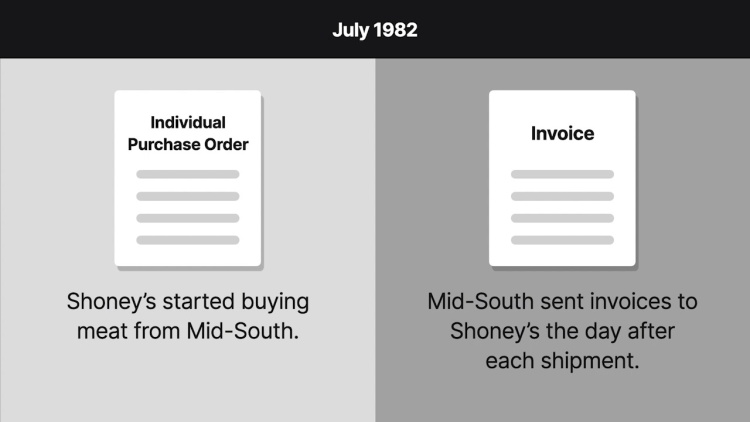Mid-South Packers, Inc. v. Shoney’s, Inc.
United States Court of Appeals for the Fifth Circuit
761 F.2d 1117 (1985)
- Written by Mary Pfotenhauer, JD
Facts
At a meeting on April 17, 1982 between Mid-South Packers, Inc. (Mid-South) (plaintiff) and Shoney’s, Inc. (Shoney’s) (defendant), Mid-South presented Shoney’s with a proposal letter setting out the prices and terms at which Mid-South would supply meat to Shoney’s. The letter stated that Mid-South would inform Shoney’s 45 days before any price change, but did not include any terms as to quantity or duration. Shoney’s later began buying meat from Mid-South. Shoney’s would send a purchase order to Mid-South for each desired delivery, and after every shipment, Mid-South would send an invoice to Shoney’s. At a meeting on August 12, 1982, Mid-South informed Shoney’s that the price per pound of meat was increasing. On August 18, Shoney’s submitted another purchase order, and it continued to submit purchase orders, and Mid-South continued to deliver meat. Shoney’s paid the invoices reflecting the increased price. On its final order, Shoney’s offset the amount due on the invoice by $26,208, the difference between the original price and the increased price it had paid on its previous orders. Mid-South sued to recover the amount of the offset. The district court granted Mid-South’s motion for summary judgment. Shoney’s appealed.
Rule of Law
Issue
Holding and Reasoning (Per Curiam)
What to do next…
Here's why 907,000 law students have relied on our case briefs:
- Written by law professors and practitioners, not other law students. 47,100 briefs, keyed to 996 casebooks. Top-notch customer support.
- The right amount of information, includes the facts, issues, rule of law, holding and reasoning, and any concurrences and dissents.
- Access in your classes, works on your mobile and tablet. Massive library of related video lessons and high quality multiple-choice questions.
- Easy to use, uniform format for every case brief. Written in plain English, not in legalese. Our briefs summarize and simplify; they don’t just repeat the court’s language.





